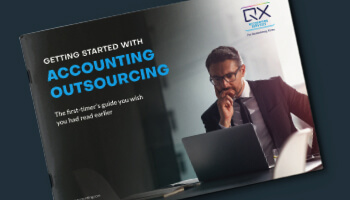
Choose The Best Outsourced Accounting Service Provider
- An award-winning accounting outsourcing company that is SOC 2 Compliant
- ACCA-approved Gold Employer
- ISO 27001 compliance for security and ISO 9001 compliant for quality management
- A steady stream of qualified accountants through the QX Academy
- Stay on top of all accounting jobs with the QX Tracker App
- Flexible engagement models catering to all requirements, whether big, minor, temporary, or permanent
How We Simplify Your Accounting Process
- Complex accounting jobs
- Financial review & management reporting
- Industry-specific accounting software skills
- Report compilation
- Generating paychecks
- Payroll return filing
- Sales tax working & return filing
- Other accounting-related jobs

- Source Documents
- Current year documents and files (Bank Statements, CC Statements, Etc)
- Project Checklist
- Online/Offline Software Access
- Budgeted Hours (If already estimated)
- Special Instructions (If Any)

- Excel working papers with indices, hyperlinks, lead schedules, and control accounts
- Full set of accounts
- Abbreviated accounts
- Software backup

Explore Resources
Customer Success Stories
“Cristopher Carmona, CPA, speaks about his bookkeeping outsourcing experience with QXAS. He emphasizes how efficiently the team set up everything remotely and executed all functions without hiccups. "
FAQs
We offer outsourced accounting services for small businesses as well as medium and large-sized accounting firms. Accordingly, we offer two primary engagement models: the Pay-As-You-Go and the Dedicated Resource or Full-Time Equivalent (FTE) model. Your accounting firm can choose the outsourced accounting services model best suits your needs.
Accounting process outsourcing is divided into five primary phases that start with project evaluation and end with transformation. We begin by getting a clear idea of the volume of work and a better understanding of your accounting firm and its internal processes. This will allow us to identify the right people, processes, and platforms to handle your requirement. It then proceeds to project execution and the transition process.
QX Accounting Services adopts a ‘Security First’ Approach across its account outsourcing processes. We are SOC 2 Type 2 Compliant, GDPR Compliant, and also ISO 27001 certified for security. Your financial data is in safe hands with us, and we ensure that it doesn’t pass into the wrong hands.
With the QXAS Tracker App, you can monitor the progress of your accounting tasks in real-time. If you are looking for outsourced accounting services, we are one of the best providers because all you need is a mobile phone – download this app onto it, and you are ready to keep up with all your outsourced accounting tasks.
You are the best judge of whether this is the right decision for you, but we say it is. Outsourced accounting services bring a lot of cost efficiencies to the table, will improve business profitability, and free up a lot of time invested in other revenue-generating activities.
Outsourcing your accounting is a strategic move for CPAs and accounting firms seeking efficiency and growth. Here’s why:
- Cost Reduction: Outsourcing converts fixed costs into variable costs, offering significant savings on overheads.
- Access to Expertise: You gain access to a pool of professionals with diverse expertise and experience, ensuring high-quality accounting work.
- Focus on Core Business: By outsourcing, CPAs can devote more time and resources to core business activities like client management and strategic planning.
- Scalability: Outsourcing offers the flexibility to scale services up or down based on demand without the need for additional hires.
- Technological Edge: Outsourcing firms often use advanced accounting software and tools, providing you with cutting-edge solutions without the hefty investment.
- Risk Management: With specialists handling your accounting, compliance and regulatory risks are significantly reduced.
To outsource your accounting means to embrace efficiency, expertise, and strategic growth opportunities.
Absolutely, reputable firms offering to outsource your accounting services typically have a portfolio of client references. These references are from various CPAs and accounting firms that have successfully outsourced their accounting functions. These testimonials often highlight the efficiency gains, cost savings, and enhanced financial reporting quality experienced by these clients.
When considering partnering with accounting outsourcing firms, it’s advisable to request such references. This enables you to gauge the service provider’s expertise, reliability, and the kind of results you can expect. Moreover, speaking directly with these references can provide insights into the provider’s communication, problem-solving capabilities, and their ability to adapt to different accounting needs.
Remember, trustworthy accounting outsourcing firms will be transparent and eager to share client success stories, giving you confidence in their ability to handle your accounting needs effectively.
Deciding to outsource accounting can be pivotal for CPAs and accounting firms. Here’s why it’s worth considering:
- Focus on Core Business: Outsourcing routine accounting tasks allows firms to concentrate on core business areas, enhancing overall strategy and client engagement.
- Cost Savings: It’s often more cost-effective to outsource than to maintain an in-house team, especially for smaller firms or during off-peak seasons.
- Access to Expertise: Outsourcing provides access to a broader pool of specialized expertise, which might not be feasible to have in-house.
- Scalability and Flexibility: Outsourcing offers the flexibility to scale services up or down based on demand, a significant advantage during fluctuating workloads.
- Risk Reduction: With outsourced experts, the risk of errors is reduced, ensuring compliance and accuracy in accounting practices.
Ultimately, whether to outsource accounting depends on the firm’s specific needs, but the potential benefits make it a strategy worth considering for efficiency, growth, and competitive advantage.
Accounting outsourcing at QX operates through a streamlined, client-centric approach specifically tailored for CPAs and accounting firms.
Initially, QX collaborates with clients to understand their specific needs and workflows. This phase ensures that the outsourcing aligns seamlessly with the firm’s existing processes.
Following this, a dedicated team of accounting professionals, adept in the latest accounting standards and technologies, is assigned to each client.
The team at QX Accounting Services then takes over various accounting tasks, ranging from routine bookkeeping to complex tax preparation and financial analysis. They utilize advanced accounting software and maintain consistent communication with the client to ensure accuracy and transparency. Regular reports and insights are provided, enabling firms to make informed decisions.
Accounting outsourcing at QX is a blend of personalized service, professional expertise, and technological proficiency aimed at enhancing efficiency and scalability for CPAs and accounting firms.
When considering outsourced accounting services, the cost factor is as diverse as the services offered. It’s not a one-size-fits-all scenario; instead, the price depends on the specific needs of your firm. Factors influencing cost include the scope of services (like basic bookkeeping, comprehensive financial management, or strategic financial planning), the size of your firm, and the complexity of your financial transactions.
For CPAs and accounting firms, it’s crucial to weigh the costs against the benefits. Outsourcing can streamline operations, introduce advanced technology, and offer access to specialized expertise, which might not be feasible in-house. The real value lies in how these services can free up your firm’s resources, allowing a sharper focus on client relationships and strategic growth. Ultimately, the investment in outsourced accounting services is about enhancing efficiency, accuracy, and the strategic capabilities of your firm.
At QX, we are fully prepared to meet the accounting outsourcing needs of your CPA firm. Tailored specifically for CPAs and accounting firms, our services encompass a wide range of solutions, from meticulous bookkeeping to comprehensive tax preparation, payroll processing, and audit support. Our team of skilled professionals is dedicated to providing top-tier accounting outsourcing services, ensuring that every task is executed with the highest level of precision and efficiency.
Understanding the unique demands of the accounting industry, we at QX leverage advanced technology and proven methodologies to deliver results that not only meet but exceed your expectations. We pride ourselves on our ability to adapt our services to the specific requirements of your firm, offering personalized support that aligns seamlessly with your business objectives.
QX is your go-to partner for reliable, efficient, and high-quality accounting outsourcing services, committed to enhancing the operational effectiveness of CPAs and accounting firms.
Outsourcing accounting involves delegating financial tasks to an external service provider. Here’s a concise rundown of the process, tailored for CPAs and accounting firms:
- Identify Needs: Determine which accounting tasks to outsource, such as bookkeeping, tax preparation, or payroll processing.
- Choose a Provider: Select an outsourcing accounting partner based on expertise, technology use, data security certifications, and client testimonials.
- Define Scope and Terms: Clearly outline the tasks, timelines, and confidentiality terms with the provider.
- Transition: Seamlessly transfer the identified tasks to the outsourcing team. This often includes sharing software access and financial data.
- Continuous Communication: Maintain regular communication for updates, queries, and feedback.
- Quality and Compliance Checks: Regularly review the work for accuracy and compliance with accounting standards.
This structured approach ensures that outsourcing accounting is efficient, secure, and aligns with the firm’s strategic goals.





